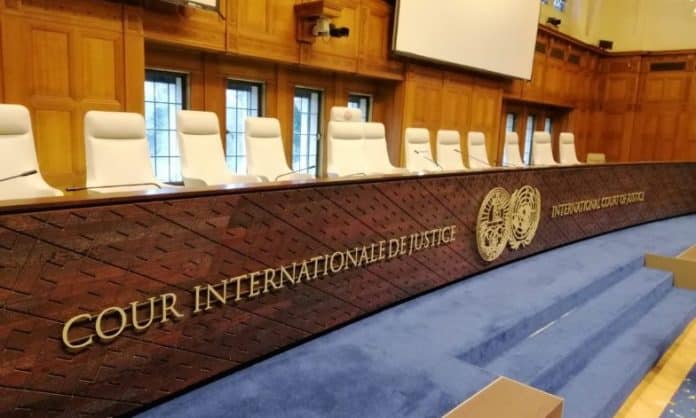South Africa filed a complaint on 29 December 2023 against Israel for “genocide” in Gaza with the International Court of Justice (ICJ), the UN tribunal responsible for settling disputes between States.
A public hearing will be held on 11 and 12 January in The Hague to examine the “provisional measures” requested by South Africa.
The complaint is accompanied by a request for emergency measures that may order an end to hostilities, motivated by the Hamas attack of the 7 October that killed 1,200 people and injured 5,000 in Israel. Pretoria calls on ICJ to order Israel to stop killing and causing serious mental and physical harm to the Palestinian people in Gaza, to stop deliberately imposing living conditions intended to bring about their physical destruction as a group, and to allow access to humanitarian aid.
The 1948 Genocide Convention
Faced with a toll of more than 22,100 people killed between mid-October and 3 January in Gaza, Pretoria invokes “its rights and obligations” to prevent genocide and “protect the Palestinians of Gaza from destruction”. These rights and obligations are exercised within the framework of the 1948 United Nations Convention on the Prevention and Punishment of the Crime of Genocide.
The Convention provides that States can take legal action to prevent a crime of genocide from occurring. It requires States parties to the Convention to take measures to prevent and punish the crime of genocide. This obligation, as well as the prohibition of committing genocide, are considered norms of customary international law and are therefore binding on all States, whether or not they are part of the 153 countries – Israel included – that have ratified the Convention.
The provisional measures requested by South Africa to cease hostilities, if taken by the ICJ, prove legally binding.
A distinct procedure from the case already in progress
This procedure is separate from another case concerning Israel and Palestine, brought by the United Nations General Assembly to the ICJ.
An advisory opinion “on the legal consequences of Israel’s practices and policies in the Occupied Palestinian Territory, including East Jerusalem“, was requested from the ICJ by a resolution of the United Nations General Assembly, adopted on 30 December 2022, before the current conflict. This procedure must be the subject of a public hearing on 19 February 2024, after receipt of written reports from numerous States.
An advisory opinion is not legally binding. However, it indicates a way forward in terms of international law and sets an important precedent.
Strained relations between South Africa and Israel
South Africa, which went through an apartheid regime from 1948 to 1991, has a long history of solidarity with Palestine, and defends its right to self-determination. Its complaint comes against a backdrop of strained relations with Israel. On 17 November, the Prosecutor’s Office of the International Criminal Court (ICC) received a referral from several countries, including South Africa, Bangladesh, Bolivia, Comoros and Djibouti to investigate the “situation in the State of Palestine “.
The Israeli ambassador in Pretoria was recalled on November 20, before the South African National Assembly adopted, with 248 votes to 91, a motion recommending the closure of the Israeli embassy until a ceasefire takes place in Gaza.
On 21 November 2023, Pretoria suspended diplomatic relations with Tel Aviv and recalled its diplomats to protest Israeli attacks in the Gaza Strip, described as “acts of genocide”.
Israel represented by a seasoned judge in The Hague
The Israeli Foreign Ministry reacted on 29 December to South Africa’s complaint before the ICJ, saying that “Israel rejects with disgust the blood libel spread by South Africa.” Minister Eli Cohen’s spokesperson criticized South Africa for a claim that “lacks both a factual and legal basis, and constitutes a despicable and contemptuous exploitation of the Court”.
The National Security AdvisorTzachi Hanegbi declared to the press that “the State of Israel has signed the convention against genocide for decades, and we certainly do not boycott the discussion. We will stand by it and repel the absurd lawsuit that is a blood libel,(…) The unfounded claim against the victim’s right to defend himself is a disgrace, and we expect all civilized countries to sympathize with our determination.”
He added that “the legal battle may extend for several years, but Israel’s immediate focus is thwarting an interim order that could force a ceasefire in Gaza.”
The appointment of Aharon Barak, a former president of the Supreme Court in Israel, to head the delegation of jurists sent by Israel to The Hague is also being debated in Israel. This seasoned jurist is criticized by the Prime Minister’s allies for opposing his reform of the judicial system in his country. On the South African side, Dikgang Moseneke, a senior magistrate who was a judge at the Constitutional Court and Deputy Chief Justice of South Africa, will lead the delegation.
The consequences of an ICJ decision
The ICJ’s provisional measures are not only legally binding, but they also have a strong symbolic dimension.
It is nevertheless the responsibility of States to apply the decisions of the Court. As the ICJ does not have the coercive means to enforce its verdicts, there remains only one enforcement mechanism if a country rejects the Court’s decision: asking the Security Council to pass a resolution.
USEFUL LINKS
- To follow the ICJ audience click here
- Israel-Palestine: the role of the international justice
- Palestine: preventing a genocide in Gaza and a new “Nakba”
- UNRIC Library Backgrounder: Genocide




